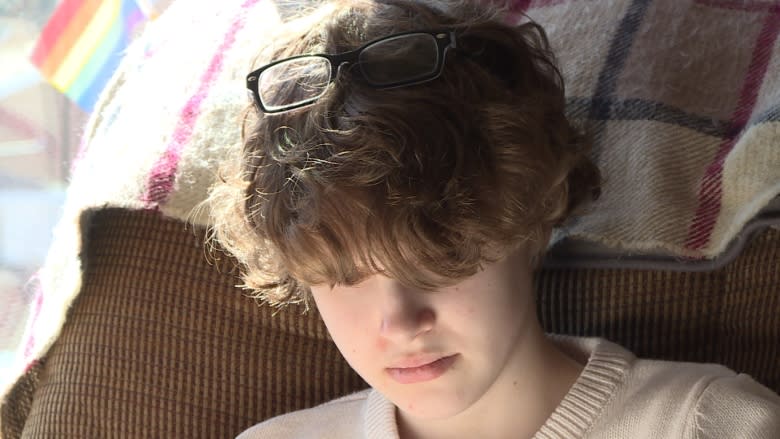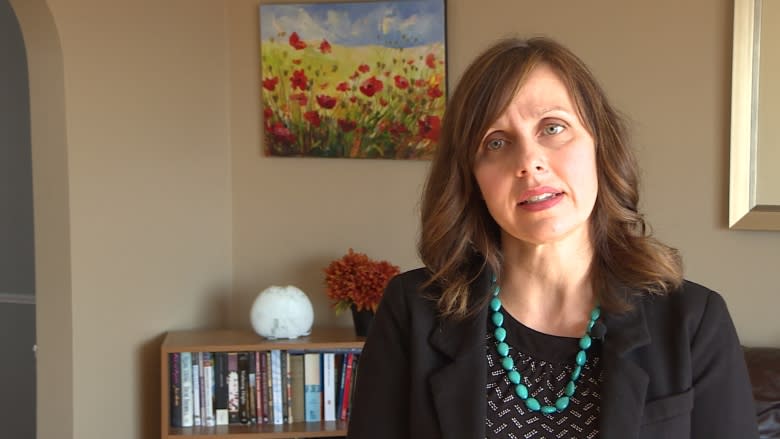Growing up trans: 14-year-old says rainbow flags, crosswalks make a difference
For Elliott Blackmore, coming out as transgender was easy.
Rebecca Blackmore, Elliott's mom, already knew that Elliott was questioning their gender — from about 10 years old. And by 12 years old, Elliott knew.
"My mom just came up to me one morning and she was like, 'Did you figure out the gender thing yet?' and I was like, 'Yeah, I'm trans.' It was pretty uneventful, almost," Elliot said.
"It's never been a super big deal to me, I don't think. It's just always been like, 'This is how I am."
Elliott, who had lived as a girl, prefers the non-specific pronouns "they" and "their," saying they feel like they belong somewhere between masculine and non-binary. Elliott's mom, though, describes her child with masculine pronouns.
While their experience coming out in Grand Falls-Windsor was positive, Elliott says they know not everyone's story is that smooth. It's why Elliott says signs and symbols like rainbow crosswalks and pride flags are important.
"It always made me really happy, to be like, I'm OK here. I can be who I am," the 14-year-old said. "These people know that I exist, and they accept me."
'Disheartening' news
Elliott said that as a transgender teen in rural Newfoundland, it's disheartening to hear about opposition to rainbow crosswalks in other communities.
Blackmore also has a message for councillors and residents in Springdale who are opposing a push by high school students to install a rainbow crosswalk between Indian River High School and Springdale's arena.
"I want to know why it is such a big deal for them," Elliott said. "LGBT people can feel accepted by a small gesture, and why does that hurt them so much? Why does that cause them so much turmoil?"
"Obviously, it is a gesture, and gestures can be hollow … but it sets a standard. It sets a, kind of, 'these people exist and we know they are here.' So it gives them no reason to keep ignoring the needs of those people and their rights."
Elliott said that while they were disappointed by the town's initial opposition to a rainbow-coloured pride crosswalk, they didn't find it surprising.
"I have grown up in a small town, and I've met people who are not always the nicest kind of people."
Growing up trans
Though Elliott's only 14, they take classes at the College of the North Atlantic in Grand Falls-Windsor in humanities. Their family decided that leaving the secondary school system was the best option.
That means Elliott doesn't have many classmates to socialize with — but they do make connections online, with other LGBT teenagers and adults.
"When you're in a small town, there's a very low pool of people to be friends with, and I had a hard time relating to a lot of them. But online I met a lot more people who I could relate to, and have shared similar experiences," Blackmore said.
"I could kind of connect to them in a way that it's kind of hard to connect with some of the people here."
Elliott said they know from their friends who attend high school every day that being LGBT there can be tough.
"People really are ignorant," they said.
Support group for parents
Since Elliott came out as trans, Rebecca Blackmore has started a central Newfoundland chapter of Parents of Trans & Gender Diverse Kids.
She hopes that by supporting parents, who are going through adjustments with their children, trans youth will get the support they need too.
"It was a challenge, even though I consider myself a very open-minded person, it was hard to think … about Elliott not as my daughter … and also getting used to different pronouns, a different name."
Rebecca Blackmore says it was well worth it.
"After he came out to us, and told us that he is in fact transgender, I could see that it was sort of like a burden off his shoulders, that he finally felt really good in his skin."




